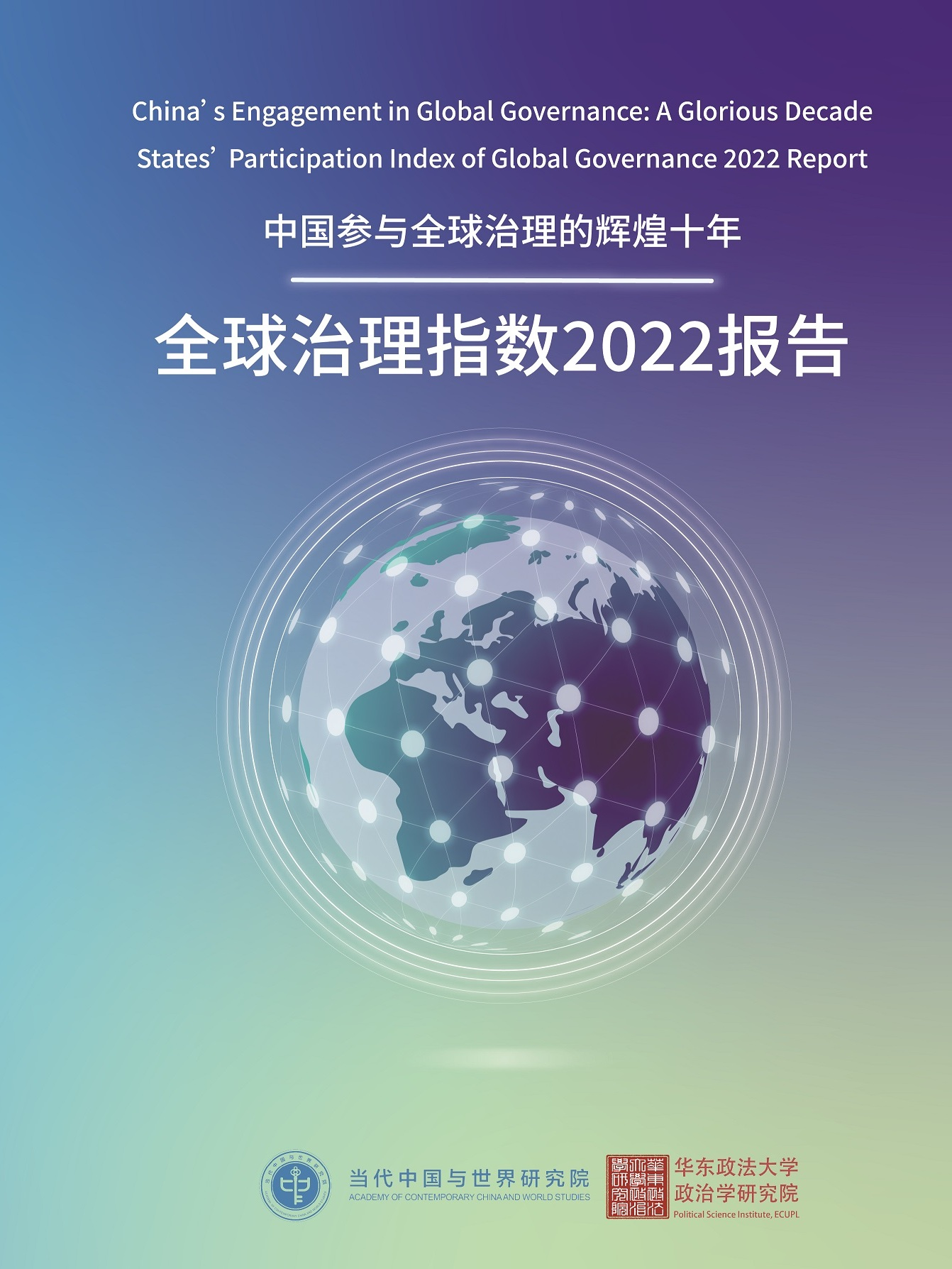'States' Participation Index of Global Governance 2022 Report' published
On Dec. 3, the "States' Participation Index of Global Governance 2022 Report" was jointly published by the Academy of Contemporary China and World Studies under China International Communications Group and the Institute of Political Science at the East China University of Political Science and Law (ECUPL). The global governance index consists of four parts: mechanism, performance, decision, and responsibility. Each of these four parts includes numerous indicators, aiming to objectively measure and evaluate the degree to which 189 countries participate in and contribute to global governance. This report is the ninth annual report published since 2014, which presents a systematic evaluation on each state's participation in global governance every year. Meanwhile, this report goes through all relevant data for the past decade according to the current indicator system. With "China's Engagement in Global Governance: A Glorious Decade" as the theme, this report summarizes the history of China's engagement in global governance, as well as its achievements and significant contributions since the 18th National Congress of the Communist Party of China.

The report concludes that, though global governance has been facing severe challenges, China has strived to overcome all difficulties and actively engaged in global governance in a deeper and more comprehensive way. For the past decade, China's participation in global governance has shifted from "partially engaged" to "fully engaged," with increased confidence. China has played an important role in global issues of governance, as it proposed the Belt and Road Initiative and the idea of a human community with a shared future, jointly founded Asian Infrastructure Investment Bank, and advanced the Agenda for Sustainable Development. The data in the past decade not only shows China's strong support for governing global issues, especially deepening its participation in intergovernmental platform of global governance, but also demonstrates China's great contribution to reviving the global economy. According to statistics from 2013 to 2021, China contributed to an average 38.6% of global economic growth, more than the combined contributions from the G7 countries. This has made China the most powerful engine boosting the world economy.
At the same time, this report provides a systematic investigation into the participation of 189 countries in global governance in 2021 based on indicators. The year 2021 was the second year of the COVID-19 pandemic, which brought an unprecedented impact to each country. Even though each country showed signs of revival, the general trend was still "struggling recovery," as shown in the indicators. Surviving from the first year of the pandemic, each country rebounded in areaslike the economy and social well-being. Nonetheless, they did not show a strong will in participating in global governance. For example, the pandemic significantly reduced the financial resources that could have been available to greenhouse gas reduction and environmental protection, posing severe threats to global environmental governance and global climate governance.
The research data indicates that China, the U.S. and France have maintained their places in the "A++" category, making their way into the top of the global governance ranking. Imbalanced recovery actually gave regional and global powers more edge to further strengthen their dominance in the global governance, while most developing and less developed countries are likely to become more alienated from global governance amid the pandemic, which is an alarming sign for the future of global governance. In particular, those exerting the least influence in global governance are in West and Central Asia, while the countries exerting the most influence remain concentrated in Western Europe, North America, and China in Asia. This North-South divide in global governance still has not been eliminated.
The press conference of the "States' Participation Index of Global Governance 2022 Report" was held online. The opening ceremony was hosted by Gao Qiqi, dean of the Institute of Political Science at ECUPL and chief expert of this project. Han Qiang, vice president of ECUPL, delivered the welcome speech. He spoke highly of the long-term effort dedicated to this research and positive social influence produced by this report. He called for making full use of this report and strengthening academic research based on it.
At the press conference, Yan Xingjian, director of the global governance index project from the Institute of Political Science at ECUPL, offered a systematic analysis of the report. Experts attending the meeting carried out in-depth discussions focused on the report and other relevant issues of global governance, giving advice in further revision.
Sun Jingxin, vice president of the Academy of Contemporary China and World Studies, said that subsequent work on the report will be of great significance. First, it can improve dialogues with international peers, which could facilitate promoting China's voice in the realm. Second, it can help to achieve theoretical consensus domestically, which could contribute to the building of an independent knowledge system and an academic community. Third, it can provide decision makers with academic guidance related to global governance. Fourth, it could direct more public attention to China's foreign policies in handling global issues. Sun suggested that the report go through expert review to obtain more professional ideas beyond data analysis, in order to make it more convincible and acceptable, and lay a solid foundation for promotion on domestic and international levels.
He Qisong, a professor at the School of Government Administration at ECUPL, said the report presents highly scientific research findings by assessing each country's contribution to global governance based on relevant data and indicators, which can promote global governance participation and enhance China's say on academic and policy levels. More importantly, he said the report shows that Chinese modernization in the past decade has been effective, and the country's practice in shaping a new model of globalization with Chinese characteristics has provided a vivid example and reference for other developing countries to modernize. In addition, the Chinese path to modernization is also helpful to promote value diversity, discourse equality, and openness and inclusiveness in global governance system. "We should put more effort on promoting global governance index abroad, and encourage researchers to actively cite relevant report and data to enhance the vitality of the global governance index," he said.
Song Wei, a professor at the National Academy of Development and Strategy at Renmin University of China, gave high praise to the report for its large body of data, opinions, and findings. Based on data from authoritative sources, this report constructs a scientific and reasonable indicator system, which greatly increases the credibility of its conclusions, he said. Nevertheless, Song said there is room for improvement, and pointed out that this report could have put more focus on collecting data of domestic governance when constructing the indicator of "performance," and it lacks investigations into how each country makes the world a better place through their participation in global governance. Given the fact that NGOs have played crucial part in global governance, this report could have taken this into consideration, Song said.
Zhao Kejin, associate dean of the School of Social Sciences of Tsinghua University, said that this report demonstrates the strengths and achievements of China's participation in global governance. However, he said its shortcomings and deficiencies also deserve attention, so as to make the research more in-depth and improve the assessment system. For instance, the relatively simple presentation of the overall index on evaluating China's decision-making and influence on global governance does not necessarily provide a panoramic view of China's participation in global governance.
"We should put more focus on its drawbacks, which makes room for improvement," Zhao said. "At the same time, compared with Western countries, China put more emphasis on state-led global governance, while neglecting the influence from non-state actors. In further research, we should make comparison with non-state actors, so we are able to find out our own advantages and make good use of it."
Liu Xuelian, director of the Northeast Asia Institute of Geopolitics and Economics of Jilin University, said she strongly admired the persistent work dedicated to the global governance index in the past decade, and suggested combining this report with the team's cutting-edge research on big data. Liu also pointed out that the data accumulated for the global governance index can provide important support for theoretical research, so the report should also address key problems in the global governance field in response to issues of wide concern in the academic community, such as the dilemmas and changes faced by global governance, the role of emerging countries in global governance, and how to advance the reform of global governance system. Hence, a more organic interaction between the development of the index system and academic research can be formed, and the significance of this report will become more prominent, she said.
During the press conference, attendees also joined the third forum for global governance reform hosted by the Institute of Political Science at ECUPL, which had the theme of "Chinese Path to Modernization and Global Governance System Reform." The forum's participants included Yu Keping, director of Peking University Research Center for Chinese Politics; Wang Zhengyi, deputy director of the School of Social Sciences at Peking University; Huang Renwei, executive vice dean of Fudan Institute of Belt and Road & Global Governance; Wu Zhicheng, associate dean of Institute of International Strategy at the National Academy of Governance; Liu Hongwu, dean of Institute of African Studies at Zhejiang Normal University; Yang Xuedong, dean of the Department of Political Science, School of Social Sciences, Tsinghua University; Ren Xiao, a professor at the Institute of International Studies at Fudan University; Men Honghua, dean of the School of Political Science & International Relations at Tongji University; and Liu Zhenye, associate dean of Globalization and Global Issues Institute at China University of Political Science and Law. The forum participants delivered keynote speeches and conducted in-depth discussions on the topics of global civilization and global governance, the Chinese path to modernization and global governance, China's participation in global governance, and global change and the construction of a new model of international relations.


